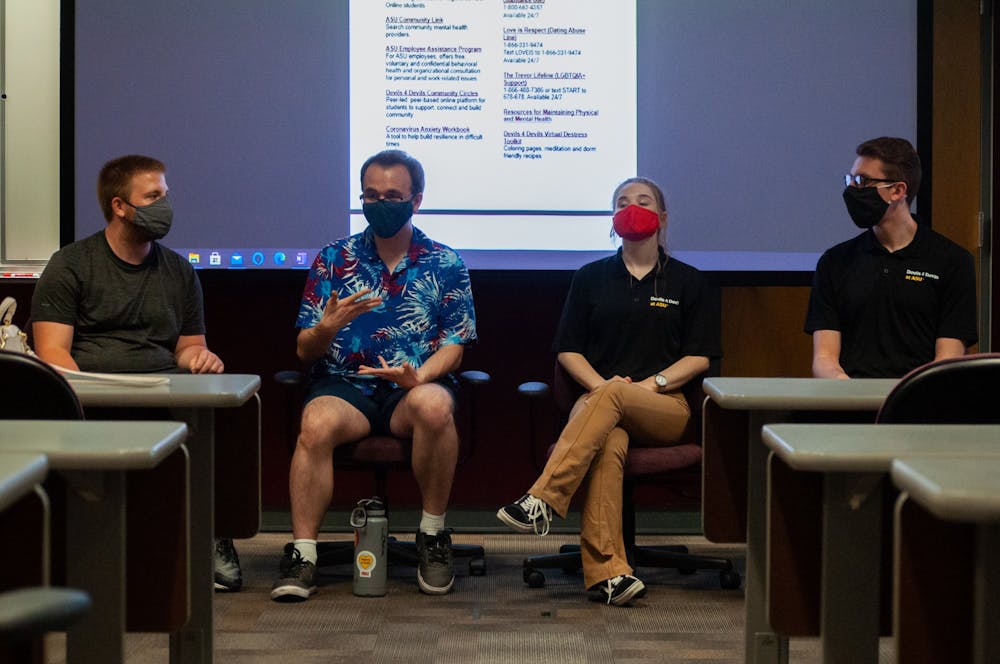In response to mental health stigma that follows news of mass shootings, March For Our Lives ASU collaborated with other student organizations specializing in mental health to create the first Mental Health Awareness Forum, an opportunity for students to learn how addressing mental health can impact gun violence.
As a movement that has been led by young people, a forum by March For Our Lives ASU, Active Minds ASU and Devils 4 Devils, provided an opportunity for students to inform their peers on how mental health stigma and gun violence intersect. Leaders answered questions Monday evening to a camera, where students could watch the discussion via Zoom.
Secretary for March For Our Lives ASU Mia Olivas, a sophomore studying sociology, said she hoped the forum would help destigmatize mental health through creating a safe space to discuss it.
"In my opinion a lot of people are afraid to reach out for help because of the somewhat negative connotations that surround mental health," Olivas said. "Talking about the issue can help people realize that it is okay to reach out for help when it's needed."
Gregory Carnesi, president of Active Minds ASU, a club that aims to reduce mental health stigma, said it is necessary to address mental health for the sake of a gun owner's safety and the safety of those around them.
"(The media) will say yes, this person (who committed mass violence) had this mental health condition ... and no one did anything about it," said Carnesi, a senior studying psychology. "Looking into interventions and how can we get people the necessary resources and treatment they need, I think ... it's most important."
Red flag laws, a conversation point in the forum, are used to prevent people from having firearms if there is a consensus that the gun owner will harm themselves or others. Red flag laws have been proposed in Arizona, but have failed to pass.
However, it is state law and ASU policy that University students cannot have guns on campus unless they are stored inside a car or motorcycle. Certified police officers are the only people allowed to carry guns on college campuses.
READ MORE: ASU’s gun policy: What’s allowed, what’s not and what’s next?
Emily Hinsberger, a senior studying psychology and president of Devils 4 Devils, a student-led organization that works closely with ASU to advocate for student mental health, said it is important to understand mental health not only to prevent suicide, but to "be supportive peers."
Through debate and sharing personal experiences, the panel addressed how economic status, race and gender influence the impact of gun violence and the stigma around mental health.
Serena Sabbara, a sophomore studying psychology and neuroscience, was concerned about how low income communities, especially communities of color, are impacted by gun violence and a lack of discussion about mental health.
"Black communities, for example, are over-policed and often killed because of it," Sabbara said. "If we change the conversation and destigmatize mental health, we can approach the issue better, (create) gun reform, (invest) in these communities, (invest) in mental health resources."
Considering the impact of gun violence on communities across America, president of March For Our Lives ASU, Jacob Sumner, a senior studying computer science and political science, said some politicians tend to blame gun violence on other issues, rather than directly address it through policy.
"(Republican politicians) blame gun violence on mental health issues, or they blame it on video games or things ... that happen in other countries ... (that) don't have the same problem with mass shootings that we do."
The panelists concluded their discussion by providing advice about how students should help those they think may be having mental health problems.
Vice president of Devils 4 Devils, Carter Bower, a junior studying psychology and neuroscience, said it is best to prompt an honest conversation with the person of concern.
"Just be honest," Bower said. "Like, 'I don't really know what I'm doing, but I see these in you and this isn't really like you. What's going on?'"
ASU Counseling Services offers counseling for students and Live Well @ ASU provides information about what students should do if they are concerned "for a friend" who may be "struggling emotionally."
For those who are not satisfied with ASU’s mental health resources, Hinsberger said she recommends that students voice their concerns.
"I will say they are listening, that they really are trying to make things work," Hinsberger said. "(We need to make) sure that we not only voice how we feel about such resources, but also that we're in the process of supporting the people around us."
Reach the reporter at awaiss@asu.edu and follow @WaissAlexis on Twitter.
Like The State Press on Facebook and follow @statepress on Twitter.
Continue supporting student journalism and donate to The State Press today.

Alexis Waiss is an assignment editor and senior reporter, covering breaking news and writing long-form stories. Alexis worked on SP's politics desk for a year, where she reported on the Legislature, higher education policy, student government, the city of Tempe and stories highlighting social justice. She previously worked as a fellow for the Asian American Journalist Association's VOICES program.




